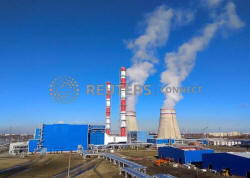Russia launches plant to reduce Kaliningrad's reliance
on EU grid
 Send a link to a friend
Send a link to a friend
 [March 06, 2019]
By Anastasia Lyrchikova [March 06, 2019]
By Anastasia Lyrchikova
KALININGRAD, Russia (Reuters) - Russia
launched a new power plant on Wednesday to help make its Kaliningrad
exclave in Europe self-reliant, as its European Union neighbors seek to
unplug their power grids from Russia.
Kaliningrad has no border with mainland Russia and has relied on its
neighbor Lithuania, which in turn imports power from mainland Russia.
But Lithuania, along with fellow European Union member states in the
Baltic, Estonia and Latvia, plans to unplug itself from Russian power
and integrate instead into the EU grid by 2025.
European diplomats say this disentangling of power grids creates the
potential for a political flare-up between Russia and the EU. If any
unforeseen events result in Kaliningrad having its power supply
disrupted, Russia could perceive that as a hostile act by EU states.

The critical phase was due later this year when Baltic states were set
to begin testing unplugging themselves from the Russian grid, but those
tests have been postponed and no new date agreed.
Russia is to conduct its own test, by temporarily unplugging Kaliningrad
from neighboring states, in May this year, Deputy Prime Minister Dmitry
Kozak told reporters in Kaliningrad on Wednesday.
Kozak said the Baltics have told Russia they will conduct their test
after Kaliningrad has conducted its own test.
[to top of second column] |

General view of the Pregolsky gas-powered station in Kaliningrad,
Russia March 6, 2019. REUTERS/Anastasia Lyrchikova

Russian state energy holding InterRAO on Wednesday announced the launch of the
Pregolsky gas-powered station which, with a capacity of 455.2 megawatts is the
largest of four stations Moscow hopes will make Kaliningrad self-sufficient.
The Mayakovskaya and Talakhovskaya plants, which are also gas powered and have a
combined power of 312 megawatts, went online in March last year.
The fourth - the coal-powered Primorsky plant - should be completed in 2020, and
will function as a backup plant. The stations will have a combined capacity of
around 1 gigawatt.
"The region will become fully energy independent once the construction of the
reserve Primorsky thermal power station is completed," InterRAO cited its head,
Boris Kovalchuk, as saying.
The 100 billion rouble project is financed by state holding company Rosneftegaz,
which is funded by dividends from energy giants Gazprom and Rosneft.
(Additional reporting by Andrius Sytas in Vilnius; Writing by Tom Balmforth;
Editing by Elaine Hardcastle)
[© 2019 Thomson Reuters. All rights
reserved.] Copyright 2019 Reuters. All rights reserved. This material may not be published,
broadcast, rewritten or redistributed.
Thompson Reuters is solely responsible for this content. |